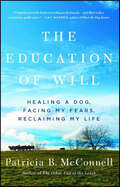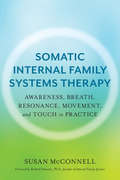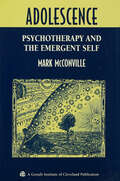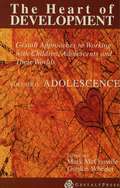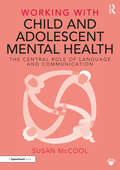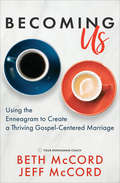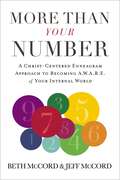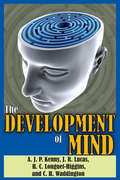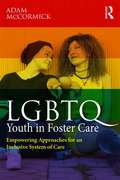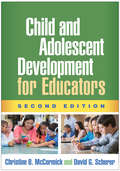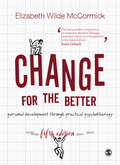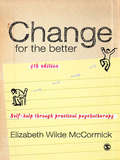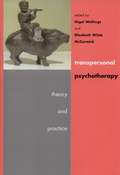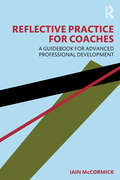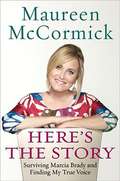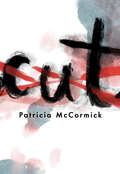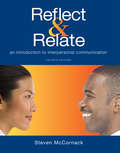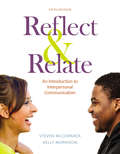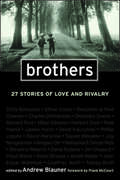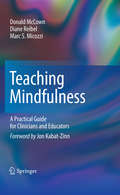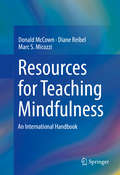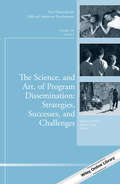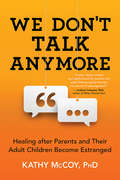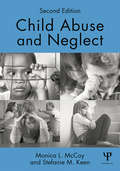- Table View
- List View
The Education of Will: Healing a Dog, Facing My Fears, Reclaiming My Life
by Patricia B. McConnellBestselling author and internationally renowned animal psychologist and dog trainer Patricia McConnell &“gives a voice to those who can&’t speak in words and provides hope for fearful animals everywhere&” (Temple Grandin) in this powerful and uplifting memoir about healing.World-renowned as a source of science and soul, Patricia McConnell combines brilliant insights into canine behavior with heartwarming stories of her own dogs and their life on the farm. Now, she reveals that it wasn&’t just the dogs who had serious problems. For decades Dr. McConnell secretly grappled with her own guilt and fear, which were rooted in the harrowing traumas of her youth. Patricia is forced to face her past by her love for a young Border Collie named Will, whose frequent, unpredictable outbreaks of fear and fury shake Patricia to her core. In order to save Will from this dangerous behavior, she must find her own will to heal, and along the way learn that will power by itself is not enough. Interweaving enlightening stories of her clients&’ dogs with tales of her deepening bond with Will, this is a &“compassionate account of the reclamation of the author's life from abuse and shame. An uplifting story of hope about how both dogs and humans need "a sense that they are not helpless victims" (Kirkus Reviews).
Somatic Internal Family Systems Therapy: Awareness, Breath, Resonance, Movement and Touch in Practice
by Susan McConnellApplying somatic principles to the Internal Family Systems modelA Practitioner's Guide to Somatic IFS introduces a new therapeutic modality that blends principles of somatic therapy--like movement, touch, and breathwork--with the traditional tools of the Internal Family Systems framework. Broadening the benefits and applications of the IFS model, author Susan McConnell introduces 5 core practices that mental health professionals can apply to their practice: somatic awareness, conscious breathing, radical resonance, mindful movement, and attuned touch. Clinical applications include the treatment of depression, trauma, anxiety, eating disorders, chronic illness, and attachment disorders. Within the IFS framework, clients will learn to identify their "inner worlds"--the discrete subpersonalities within each of us that hold emotions, perceptions, and belief systems, and that affect our behavior and emotional wellness. Body-based somatic tools are incorporated into therapy as patients learn to recognize different facets of their internal family and reconcile the needs of subpersonalities--like their inner child or internal manager--to bring more harmony to their physical and emotional well-being.
Adolescence: Psychotherapy and the Emergent Self
by Mark McConvilleMany therapists can attest to the fact that adolescents can be difficult and frustating clients-problems are seldom well defined, clearly delineated symptoms are more exception than the rule, and troubling situations often involve the entire family. Gestalt therapist Mark McConville draws on his more than twenty years of professional experience to offer clinicians an effective model for understanding and treating adolescents. He outlines the Developmental Tasks Model, which describes adolescents' struggles, "temporary insanity," and ultimately, triumph of development. He clearly demonstrates that the Gestalt therapeutic model bridges the theoretical and clinical gap, and offers an indepth exploration of the various aspects of clinical work. Adolescence offers valuable nuts-and-bolts advice on initiating therapy with adolescents who are not yet ready to do the self-reflective, exploratory work. In addition, the book examines the therapeutic method of engaging and cultivating the adolescent's emerging inner world. With perception and sensitivity, McConville explains how the clinician can guide the adolescent in the very personal and subjective process of birthing and existential self. The book details the process of the creative reorganization of the self during adolescence and explores the changes that take place in the adolescent's relationships with peers, parents, and others in the adult world. The author also tracks the interplay of intrapsychic and interpersonal boundary development and shows how this interplay manifests itself in relationships and evolves from early through late adolescence. The Gestalt model of therapy allows the clinician to make sense of the confusion of the adolescent world and map out the multiple possibilities of clinical interventions.
Heart of Development, V. 2: Adolescence
by Mark McConville Gordon WheelerIn these groundbreaking new collections, the reader will find an exciting, boad-ranging selection of work showing an array of applications of the Gestalt model to working with children, adolescents, and their families and worlds. From the theoretical to the hands-on, and from the clinical office or playroom to family settings, schools, institutions, and the community, these chapters take us on a rewarding tour of the vibrant, productive range of Gestalt work today, always focusing on the first two decades of life. With each new topic and setting, fresh and creative ideas and interventions are offered and described, for use by practitioners of every school and method.
Working with Child and Adolescent Mental Health: The Central Role of Language and Communication (Working With)
by Susan McCoolIn children, mental health challenges and communication differences typically combine in complex and inter-related ways. Remarkably, this crucial point is all too often forgotten, and communication is overlooked. Services are frequently fragmented, leading professionals to look at children through distinct lenses of either mental health or communication, meaning insights can be incomplete and important perspectives unshared. Working with Child and Adolescent Mental Health makes the compelling case that communication is central and should be a primary consideration whenever we think about children’s mental health. With a practical focus, and an easy- to-read format, it suggests how this can be achieved by identifying how practitioners and services can work more cohesively to understand and optimise children’s communication capacities. This book includes: • Practical advice, grounded in current research, and presented in an easy-to-read, digestible style • Guidance to help practitioners competently and compassionately identify and respond to the needs of children and young people with complex combined communication and mental health needs • Real-life case studies from a wide range of settings, unpicked to clearly illustrate topics discussed in the book and offer encouragement and inspiration to practitioners • Checklists and questionnaires to help practitioners in daily practice • Recommendations for, and links to, useful additional resources • Tools to support reflection and enhancement for individual practitioners and services Essential reading for speech and language therapists, psychologists, mental health practitioners, educators, social workers, and anyone else concerned with children’s wellbeing and resilience, this book highlights the transformational impact of placing communication at the heart of all efforts to support children and young people’s mental health.
Becoming Us: Using the Enneagram to Create a Thriving Gospel-Centered Marriage
by Beth McCord Jeff McCordHow Christian couples can understand their personality types—and build a more powerful bond of love. He doesn't listen to me . . . I don't understand her . . . Why do we keep having the same fight? If you’ve ever felt baffled by the person you married, join Enneagram Coach Beth McCord and her husband, Pastor Jeff McCord, as they pull back the curtain to reveal why you and your spouse behave in different ways. Applying the Enneagram through the lens of the gospel, they provide practical steps, insights, and tools to better understand yourself and each other. This book will help you: Answer the question, “Why do they do that?”Stop committing “assumicide” about each other’s motives and dramatically improve your communicationRelate to your spouse in ways they actually understandAwaken a tired marriage that feels like it’s on cruise controlDefuse conflict before it starts, especially the same old “dance”Enjoy your spouse again, even if you’ve loved each other for years! Whether you’re preparing for marriage or celebrating a fiftieth anniversary, Becoming Us will revolutionize the way you understand yourself and your spouse, and transform your marriage into the powerful, loving, and satisfying relationship that God intended. “An insightful resource for those who want to understand themselves, their spouse, and their marriage through the lens of faith and the tool of the Enneagram.” —Ian Morgan Cron, Enneagram expert and author of The Road Back to You
More Than Your Number: A Christ-Centered Enneagram Approach to Becoming AWARE of Your Internal World
by Beth McCord Jeff McCordHave you wanted to dive deeper into the Enneagram but resisted because you don&’t want to be labeled? Or do you ever wonder, Why does this part of me still get so easily stuck? What&’s next? Discover a revolutionary and transformative approach to the Enneagram in this thoughtful, explorative guide to understanding all the remarkably unique ways you reflect the image of God . . . because you are more than your number. More Than Your Number takes a deeper dive into the world of the Enneagram by moving past the quickly assigned and sometimes stereotypical Enneagram Types to consider and engage your unique, multidimensional personality that makes you so much more complex than just a number. Explore the Enneagram beyond the surface in a thought-provoking journey to discover your previously unexplored Enneagram Internal Profile (EIP). By clearly identifying five unique parts—such as &“family members&” within your internal world—you&’ll be able to not only name what has affected you your entire life, whether positively or negatively, but also understand and apply the truth of how God intends to redeem and use all of you, not just parts of you.Through the EIP, Enneagram coaches Beth and Jeff McCord provide a simple, tested, personal strategy to understand and welcome these parts through God&’s grace, equipping you to better lead and shepherd your internal interests. You can become AWARE of these parts by: awakening to our thoughts, feelings, body sensations, and inclinations;welcoming these experiences without judgment;asking the Holy Spirit for guidance;receiving what is true; andengaging with God, yourself, and our relationships in a new way. Discover your real identity in Christ, readjusting your internal world toward a healthier path for your unique personality type.
The Development of Mind
by William McCordThe experimental and highly regarded Gifford Lectures at Edinburgh University was endowed in the late nineteenth century. Over the years, participants have including many leading representatives of religion, science, and philosophy. This series has as its subject, The Development of Mind. First published in 1972, the series continues to attract widespread interest. In this volume, contributors argue about the mind from diverse analytical standpoints.The focus of the series remains the relationship between religion, science, and philosophy. This volume attempts to achieve a comprehensive view of the subject of mind. The mental development of children in the light of modern psychology is discussed, and the distinction between "how" and "why" questions is put forward with clarity. The development of mind is further contrasted with the evolution of embryos in the young. The mind is considered as a capacity for intellectual activity, and as a multi-purpose program. Goal-directed behavior and language development are given importance, and issues of cosmic purpose, and the how and why of evolution, are never far from the surface of the argument.The lecturers know their opposition and their positions, and the cut-and-thrust of the discussion has much acumen and wit to it. Issues ranging from the impact of mind on theories of religion, causation, and rational will are examined in an informal, yet compelling, manner.
LGBTQ Youth in Foster Care: Empowering Approaches for an Inclusive System of Care
by Adam McCormickRepresenting an often overlooked population in social work literature, this book explores the experiences of LGBTQ youth as they navigate the child welfare system. Adam McCormick examines the entirety of a youth’s experience, from referral into care and challenges to obtaining permanency to aging out or leaving care. Included throughout the book are stories from LGBTQ youth that address personal issues such as abuse, bullying and harassment, and double standards. Filled with resources to foster resilience and empower youth, this book is ideal for professionals who are hoping to create a more inclusive and affirming system of care for LGBTQ youth.
Child and Adolescent Development for Educators, Second Edition
by Christine B. McCormick David G. SchererThis accessible text--now revised and updated--has given thousands of future educators a solid grounding in developmental science to inform their work in schools. The book reviews major theories of development and their impact on educational practice. Chapters examine how teaching and learning intersect with specific domains of child and adolescent development--language, intelligence and intellectual diversity, motivation, family and peer relationships, gender roles, and mental health. Pedagogical features include chapter summaries, definitions of key terms, and boxes addressing topics of special interest to educators. Instructors requesting a desk copy receive a supplemental test bank with objective test items and essay questions for each chapter. (First edition authors: Michael Pressley and Christine B. McCormick.) New to This Edition *Extensively revised to reflect a decade's worth of advances in developmental research, neuroscience, and genetics. *Greatly expanded coverage of family and peer relationships, with new content on social–emotional learning, social media, child care, and early intervention. *Discussions of executive function, theory of mind, and teacher–student relationships. *Increased attention to ethnic–racial, gender, and LGBT identity development. *Many new and revised practical examples and topic boxes.
Change for the Better: Personal development through practical psychotherapy
by Elizabeth Wilde McCormickThis bestselling book has helped thousands of people find ways of dealing with everyday emotional difficulties, and also supported practitioners and trainee psychotherapists in their work with patients. This fifth edition features up-to- date thinking and practice from Cognitive Analytic Psychotherapy and includes new content on: · Trauma and Complex Trauma · Mindfulness · Relational mapping · Group Work. Further updates include a new foreword, updated references, and new chapter summaries and conclusions.
Change for the Better: Personal development through practical psychotherapy
by Elizabeth Wilde McCormickThis bestselling book has helped thousands of people find ways of dealing with everyday emotional difficulties, and also supported practitioners and trainee psychotherapists in their work with patients. This fifth edition features up-to- date thinking and practice from Cognitive Analytic Psychotherapy and includes new content on: · Trauma and Complex Trauma · Mindfulness · Relational mapping · Group Work. Further updates include a new foreword, updated references, and new chapter summaries and conclusions.
Change for the Better
by Elizabeth Wilde MccormickThis is the Third Edition of the best-selling self help psychotherapy program for lay people and students of psychotherapy since first publication in 1990. The book is based upon Cognitive Analytic Therapy, a focused short term intervention pioneered and researched at Guy's and St. Thomas' Hospitals in London since the early 1980's by Dr. Anthony Ryle, and now taught and practiced throughout the UK and abroad. The book describes in ordinary language how learned patterns of responses to relating and thinking contribute to psychological problems such as depression, anxiety, phobia, and relationship difficulty. The book shows the reader how they can identify their own different inner dialogues, and the traps, dilemmas, snags, and unstable states of mind that lead to things going wrong. It offers help with the creation of written narrative and diagrams based upon the readers' own self reflection. Mindfulness-based experiential exercises are incorporated throughout the text to help nourish self awareness and change. The new edition offers a therapeutic dialogic relationship between reader and author. It includes the most recent development in CAT practice and places greater emphasis upon the transformation of unhelpful learned reciprocal role procedures that underlie relationship to oneself and to others. Change in symptoms occur when new and beneficial reciprocal roles are created. The book covers many areas of emotional distress, and the Third Edition also includes new chapters on unstable states of mind seen in people given a borderline personality diagnosis, on dissociation, eating problems, and stress.
Transpersonal Psychotherapy
by Elizabeth Wilde Mccormick Nigel Wellings`This is an enriching book for readers interested in unconscious psychological processes and who have a predilection for psychotherapy which interfaces psychology, philosophy and spirituality' - Journal of Critical Psychology, Counselling and Psychotherapy Transpersonal Psychotherapy recognizes levels of experience that take us beyond our usual sense of self, limited by the content of our personality. Whilst facilitating the emergence of self, it also actively encourages an exploration of transpersonal experience as an integral part of the individuation process. The major work proves a thorough and accessible introduction for students of psychotherapy ad interested others.
Reflective Practice for Coaches: A Guidebook for Advanced Professional Development
by Iain McCormickThis practical evidence-based guide to running Reflective Practice professional development programmes provides a dynamic and engaging resource for a wide range of coaches. Reflective Practice is a proven learning and development approach that involves consciously and deliberately thinking about experiences to develop insights and apply these within coaching practice. McCormick argues that it is vital that coaches regularly reflect on their work to develop and grow professionally, and this book provides a definitive and rich source of material on how and what to reflect on. Topics include how to reflect as an individual coach; working in pairs and small groups; applying reflective practice in a training context; and how to run advanced group sessions for coaches. The book features a wide range of practical workbook exercises to challenge the reader’s current practice and extend their capability, as well as an evidence-based guide to enhancing skills in recently developed areas such as Unified Protocol Cognitive Behavioural Therapy, Internet Supplemented Acceptance and Commitment Therapy, and Using Schema Therapy with Mindfulness Techniques. Written by a highly experienced executive coach, this book is full of practical and effective ways to become more capable and proficient. It is essential reading for any career, life or executive coach who wishes to enhance their coaching capability through reflective practice, as well as for coaching training organisations, senior executive coaches offering sessions for other coaches, and academic institutions offering coaching qualifications.
Here's the Story: Surviving Marcia Brady and Finding My True Voice
by Maureen MccormickAutobiography of the actress who played Marcia Brady on the TV show The Brady Bunch in the 60s and 70s.
Cut
by Patricia McCormickAn astonishing novel about pain, release, and recovery from two-time National Book Award finalist, Patricia McCormick.A tingle arced across my scalp. The floor tipped up at me and my body spiraled away. Then I was on the ceiling looking down, waiting to see what would happen next.Callie cuts herself. Never too deep, never enough to die. But enough to feel the pain. Enough to feel the scream inside.Now she's at Sea Pines, a "residential treatment facility" filled with girls struggling with problems of their own. Callie doesn't want to have anything to do with them. She doesn't want to have anything to do with anyone. She won't even speak.But Callie can only stay silent for so long...
Reflect & Relate
by Steven MccornackIn Reflect & Relate, distinguished teacher and scholar Steve McCornack provides students with the best theory and most up-to-date research and then helps them relate that knowledge to their own experiences. Engaging examples and a lively voice hook students into the research, while the book's features all encourage students to critically reflect on their own experiences. Based on years of classroom experience and the feedback of instructors and students alike, every element in Reflect & Relate has been carefully constructed to give students the practical skill to work through life's many challenges using better interpersonal communication. The new edition is thoroughly revised with a new chapter on Culture; new, high-interest examples throughout; and up-to-the-moment treatment of mediated communication, covering everything from Internet dating to social media. Reflect & Relate, Fourth Edition has its own dedicated version of Bedford/St. Martin's LaunchPad, which brings together all of the book's student and instructor media, making this a truly integrated print/interactive resource.
Reflect & Relate: An Introduction To Interpersonal Communication
by Steven McCornack Kelly MorrisonIn Reflect & Relate, distinguished teacher and scholar Steve McCornack provides students with the best theory and most up-to-date research and then helps them relate that knowledge to their own experiences. Engaging examples and a lively voice hook students into the research, while the book's features all encourage students to critically reflect on their own experiences. Based on years of classroom experience and the feedback of instructors and students alike, every element in Reflect & Relate has been carefully constructed to give students the practical skill to work through life’s many challenges using better interpersonal communication. The new edition is thoroughly revised with a new chapter on Culture; new, high-interest examples throughout; and up-to-the-moment treatment of mediated communication, covering everything from Internet dating to social media.
Brothers
by Frank Mccourt Andrew Blauner"The next best thing to not having a brother (as I do not) is to have Brothers."--Gay TaleseHere is a tapestry of stories about the complex and unique relationship that exists between brothers. In this book, some of our finest authors take an unvarnished look at how brothers admire and admonish, revere and revile, connect and compete, love and war with each other. With hearts and minds wide open, and, in some cases, with laugh-out-loud humor, the writers tackle a topic that is as old as the Bible and yet has been, heretofore, overlooked.Contributors range in age from twenty-four to eighty-four, and their stories from comic to tragic. Brothers examines and explores the experiences of love and loyalty and loss, of altruism and anger, of competition and compassion--the confluence of things that conspire to form the unique nature of what it is to be and to have a brother."Brother." One of our eternal and quintessential terms of endearment. Tobias Wolff writes, "The good luck of having a brother is partly the luck of having stories to tell." David Kaczynski, brother of "The Unabomber": "I'll start with the premise that a brother shows you who you are--and also who you are not. He's an image of the self, at one remove . . . You are a 'we' with your brother before you are a 'we' with any other." Mikal Gilmore refers to brotherhood as a "fidelity born of blood."We've heard that the apple doesn't fall far from the tree. But where do the apples fall in relation to each other? And are we, in fact, our brothers' keepers, after all?These stories address those questions and more, and are, like the relationships, full of intimacy and pain, joy and rage, burdens and blessings, humor and humanity.
Teaching Mindfulness
by Donald Mccown Diane K. Reibel Marc S. MicozziThe applications and use of mindfulness-based interventions in medicine, mental health care, and education have been expanding as rapidly as the empirical evidence base that is validating and recommending them. This growth has created a powerful demand for professionals who can effectively deliver these interventions, and for the training of new professionals who can enter the fold.Ironically, while the scientific literature on mindfulness has surged, little attention has been paid to the critical who and how of mindfulness pedagogy. Teaching Mindfulness is the first in-depth treatment of the person and skills of the mindfulness teacher. It is intended as a practical guide to the landscape of teaching, to help those with a new or growing interest in mindfulness-based interventions to develop both the personal authenticity and the practical know-how that can make teaching mindfulness a highly rewarding and effective way of working with others. The detail of theory and praxis it contains can also help seasoned mindfulness practitioners and teachers to articulate and understand more clearly their own pedagogical approaches. Engagingly written and enriched with vignettes from actual classes and individual sessions, this unique volume: Places the current mindfulness-based interventions in their cultural and historical context to help clarify language use, and the integration of Eastern and Western spiritual and secular traditionsOffers a highly relational understanding of mindfulness practice that supports moment-by-moment work with groups and individualsProvides guidance and materials for a highly experiential exploration of the reader's personal practice, embodiment, and application of mindfulness Describes in detail the four essential skill sets of the mindfulness teacher Proposes a comprehensive, systematic model of the intentions of teaching mindfulness as they are revealed in the mindfulness-based interventionsIncludes sample scripts for a wide range of mindfulness practices, and an extensive resource section for continued personal and career development Essential for today's practitioners and teachers of mindfulness-based interventionsTeaching Mindfulness: A Practical Guide for Clinicians and Educators brings this increasingly important discipline into clearer focus, opening dialogue for physicians, clinical and health psychologists, clinical social workers, marriage and family therapists, professional counselors, nurses, occupational therapists, physical therapists, pastoral counselors, spiritual directors, life coaches, organizational development professionals, and teachers and professionals in higher education , in short, everyone with an interest in helping others find their way into the benefits of the present moment.
Resources for Teaching Mindfulness
by Donald Mccown Diane Reibel Marc S. MicozziThis master-class-in-a-book isdesigned to guide teachers of mindfulness-based interventions (MBI) in continuingto develop more competence while raising global standards of practice andpedagogy. Starting with the central yet elusive concept of stewardship, it thenexpands upon the core components of MBI pedagogy. A series of reflective essaysby MBI teachers from around the world foregrounds differences and challenges inmeeting participants "where they are. " Such reflections are both inspiring andthought-provoking for teachers --wherever they are. The book also providespractical guidance and tools for adjusting teaching style and content forspecial populations, from chronic pain patients to trauma survivors, from healthcare professionals to clergy, and including many others. Detailed scripts andpractices, ready to adopt and adapt, offer opportunities to explore newdirections in the classroom, and to continue the life-long development of theteacher. Included in the coverage: Deepening teachers' skills of guidance of meditation practices Insights into the essential practice of inquiry and dialogue with participants New practices that allow participants to explore mindfulness together in a spoken encounter How to keep up with, review, and make clear to participants the range of scientific evidence supporting the MBIs The breadth of practical insightsand hands-on strategies makes Resourcesfor Teaching Mindfulness a unique developmental asset for a wide range ofpractitioners around the world. Among those who will benefit are physicians and other medical practitioners,health and clinical psychologists, marriage and family therapists, nurses,clinical social workers, physical and occupational therapists, health educators,and organizational development specialists.
The Science, and Art, of Program Dissemination: New Directions for Child and Adolescent Development, Number 149 (J-B CAD Single Issue Child & Adolescent Development)
by Kathleen P. McCoy Augusto DianaGain a greater awareness of the processes involved in the dissemination of evidence-based interventions, as well as existing supports that help disseminate and sustain them. Many interventions that aim to help children and adolescents are found to be efficacious every year, but program developers are often not equipped with the skills, knowledge, or tools to understand how to scale up a program or sustain it after the initial funding. Consumers (e.g., service providers, who are consumers of interventions), on the other hand, often do not understand all that goes into implementing and scaling up an intervention. This special issue: introduces readers to the problem, discusses some of the challenges with disseminating programs, and presents various supports that exist which can help scale up and sustain interventions. The authors’ goal is to promote the field of dissemination science by encouraging the sharing ofsuccesses and challenges.This is the 149th volume in this Jossey-Bass series New Directions for Child and Adolescent Development. Its mission is to provide scientific and scholarly presentations on cutting edge issues and concepts in this subject area. Each volume focuses on a specific new direction or research topic and is edited by experts from that field.
We Don't Talk Anymore: Healing after Parents and Their Adult Children Become Estranged
by Kathy MccoyBreak the silence and heal the riftEstrangement or partial estrangement from an adult son or daughter is one of a parent's worst nightmares. It can mean angry silences and anguished days and nights wondering what went wrong. Becoming estranged from a parent can be equally painful for an adult child, who may miss the relationship they once shared.Written by Kathy McCoy, one of the nation's more revered experts on family relationships, We Don't Talk Anymore is a tender and practical new exploration of estrangement for both parents and adult children. Each chapter also provides compassionate, practical insights focused on what both parents and adult children can do, including: Finding courage to reach out to your loved one Understanding the conflict and discovering a new and fulfilling connection Letting go and rebuilding your lifeFamilies deserve clarity and understanding. We Don't Talk Anymore will show you those first steps toward healing.
Child Abuse and Neglect: Second Edition
by Monica L. Mccoy Stefanie M. KeenChild abuse and neglect are examined in this new edition -- the latest research, what it entails, and how to recognize and report it. Federal law mandates the reporting of suspected child maltreatment by many professionals. This book will appeal to those who one day find themselves in the role of a mandated reporter. Engaging learning tools are integrated throughout: Focus on Research boxes provide an in-depth look at research or methodologies. Case Examples and Debates encourage discussion about the gray areas in the field. Legal Examples and Focus on Law sections explain judicial rulings including guides for locating relevant state statutes. Discussion questions promote dialogue and deepen understanding of the material. Bold faced key terms defined when first introduced also appear in the book's glossary. Conclusions and Definitions help students focus on the key concepts introduced in each chapter. The new edition also includes the following features: A thorough updating of the citations and state and federal laws, along with the latest statistics on incidence and prevalence based on the new National Incidence Study NIS-4. A new chapter on resiliency (Chapter 10) and more discussion of resilience in the face of maltreatment in the chapters on types of abuse (Chapters 4-9) provide a better understanding of why some children thrive despite experiencing maltreatment. New "Profiles" boxes that feature information about graduate training in child maltreatment, descriptions of jobs in the field, or biographies of people who work in the field to increase students' awareness of possible career opportunities. Web-based instructor and student resources including PowerPoints, weblinks, and a test bank with multiple-choice, short answer, and essay questions. More tables, figures, and photos to better illustrate and summarize key points. New sections on child maltreatment in military families (Chapter 2), child obesity as a result of maltreatment (Chapter 5), teen "sexting" and its possible prosecution as child sexual abuse and Susan Clancy's controversial thesis published in The Trauma Myth (Chapter 7). Updated and more case examples including recent events that captured the public's attention such as the case of Jessica Beagley convicted of child abuse for forcing her son to ingest hot sauce and of Latrece Jones convicted of negligent homicide for failing to have her son in a car seat. The book opens with the background on child maltreatment including its history, an overview of the research, and the risk factors. Details about mandated reporting are also explored. Different forms of maltreatment - physical abuse, neglect, psychological maltreatment, sexual abuse, fetal abuse, and Munchausen by Proxy Syndrome - are then examined, along with the new chapter on resiliency. Incidence estimates and consequences for each type of maltreatment are provided. Legal issues including forensic interviewing are then reviewed. The book concludes with an example of what happens to a child after a report is filed along with suggestions for preventing child maltreatment. Intended as a text for courses in child abuse, child maltreatment, family violence, or sexual and intimate violence taught in psychology, human development, education, criminal justice, social work, sociology, women's studies, and nursing, this book is also an invaluable resource to workers who are mandated reporters of child maltreatment and/or anyone interested in the problem.
